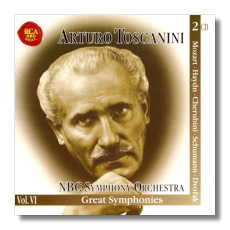
The Internet's Premier Classical Music Source
Related Links
- Latest Reviews
- More Reviews
-
By Composer
-
Collections
DVD & Blu-ray
Books
Concert Reviews
Articles/Interviews
Software
Audio
Search Amazon
Recommended Links
Site News
 CD Review
CD Review
The Immortal Toscanini, Volume VI

- Wolfgang Mozart: Symphony #40
- Franz Joseph Haydn: Symphony #94
- Luigi Cherubini: Symphony in D Major
- Robert Schumann: Symphony #3
- Antonín Dvořák: Symphony #9
NBC Symphony Orchestra/Arturo Toscanini
RCA Red Seal 74321-59481-2 ADD monaural 2CDs: 68:37, 67:42
This is the sixth volume in RCA's new Toscanini collection. Almost a decade ago, the label released its 71-volume Arturo Toscanini Collection. Late last year, however, these recordings started appearing again in a new collection. The Beethoven symphonies were the first releases, in three sets of two CDs each. Since then, the Brahms symphonies and a Schubert and Mendelssohn set also have been reissued.
Why? Because signal restoration has developed a lot in the last ten years, much better sound became possible. Some of the changes include 20-bit recording technology, UV22™ Super CD Encoding, Cello and Studer tape systems. You can notice the improvements almost at once. The sound is more open, and the instruments have a palpable physical presence. Hall resonance is more apparent now. The incipient stridency of the treble has been tamed, and the bass is more solid, albeit smooth. Hiss has been reduced without the loss of musical information. Although these recordings don't sound new by any means, their new presentation has them sounding better than they ever did before.
The earliest of these recordings is the Schumann "Rhenish," an NBC broadcast dating from November 12, 1949. The most recent is Dvořák's "New World," which was recorded in Carnegie Hall on February 2, 1953. The former is a particularly fine performance, intense but not driven. This stands in contrast to Haydn's "Surprise" Symphony (1/26/1953), which is driven into the next century by the Maestro's whipping baton. The Menuetto was written to sound more rural than urban, but Toscanini's blistering tempo and clipped rhythms turn it into a gallop in hobnailed boots. It's fun, but it's not Haydn. The Cherubini (3/10/1952) gets tender loving care, and it seems sad that this symphony isn't played and recorded as often as it once was. Try the swinging third movement and see if you don't agree. Toscanini's last "New World" has long been considered one of the best, and the slow movement is particularly effective. Elsewhere, Toscanini's brisk pace somewhat inhibits the development of atmosphere (either Czech or American), although there is a compensatory brilliance. Finally, the Mozart (3/12/1950) is played with an ear for the score's "great tragedy" (Toscanini's own words). Consequently, this is a Romantic reading, not a Classical one, and if you can accept that, Toscanini's expressivity is superb. It goes without saying that the NBC Symphony Orchestra is in excellent form throughout.
Last time I remarked that bringing these discs to market seemed to be a rush job. The spine of the present discs still identifies Toscanini's orchestra as the "NBC Symphoniy [sic] Orchestra," so I guess no one at BMG Classics reads these reviews!
Copyright © 1999, Raymond Tuttle


















